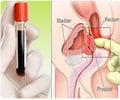Prostate cancer could soon be treated by blocking a specific protein called CDK7, which results in the death of prostate cancer cells that have undergone metastasis and are resistant to standard therapy.
- A new strategy for treating prostate cancer patients has been developed
- It involves inhibition of a specific cellular protein called CDK7 using drug molecules
- These new CDK7 inhibitors will be a boon for prostate cancer patients with advanced-stage cancer
The study, published in Cancer Discovery, was led by Dr. Irfan A. Asangani, PhD, who is an Assistant Professor of Cancer Biology in the Perelman School of Medicine at the University of Pennsylvania, Philadelphia, PA, USA.
Read More..
What is the Link between CDK7 and Prostate Cancer?
Cyclin-dependent kinase 7 (CDK7), also known as cell division protein kinase 7, is a serine/threonine kinase that is specific to humans and is encoded by the CDK7 gene. CDK7 belongs to a class of intracellular proteins, collectively known as cyclin-dependent kinases (CDK) that are activated by binding to a cyclin, which mediates the progression through the cell cycle.In the present study, it was found that CDK7 acts as a molecular “on/off” switch that regulates the expression of MED1 (mediator of RNA polymerase II transcription subunit 1), a human-specific protein encoded by the MED1 gene, which functions as a nuclear receptor co-activator. CDK7 and MED1 works in conjunction with the androgen receptor (AR) to drive the growth and progression of prostate cancer.
The research team found that turning “off” the molecular switch by blocking CDK7 with a specific drug molecule, resulted in the death of the prostate cancer cells, thereby halting cancer progression in a mouse model of prostate cancer.
What are the Drawbacks of Current Therapies for Prostate Cancer?
The currently used standard treatment for prostate cancer involves androgen deprivation therapy. However, the major drawback of this treatment modality is that many patients become resistant to the therapy, as a result of which cancer growth continues unabated and eventually undergoes metastasis. This is referred to as metastatic castration-resistant prostate cancer (CRPC).Two USFDA-approved drugs are currently available for treating CRPC, but these have shown very little benefit for the long-term survival of prostate cancer patients.
What is the Mechanism of Action of the New Therapy?
The new therapeutic strategy takes into account that the androgen receptor (AR) is the major driver of cancer growth in CRPC. Therefore, taking away its function would have a major negative impact on the survival of cancer cells.“We know that AR does not work alone; that it needs MED1 as its partner,” says Asangani. “Our study found a way to turn off MED1, leaving AR without its co-pilot, which means the cancer cannot grow and the cells eventually die.”
The research team used a specific drug molecule that switched “off” CDK7 activity, resulting in the death of the CRPC cells in both laboratory settings and in animal models. Importantly, there were hardly any off-target effects of this strategy, indicating that only the cancer cells were killed, leaving the healthy host cells unaffected.
Concluding Remarks
CDK7 inhibitors are currently undergoing evaluation in Phase I clinical trials for other types of cancer, such as leukemia, lung cancer, glioblastoma (a type of brain cancer), and breast cancer. Importantly, the present study showed that this approach could also be effective in case of prostate cancer, which warrants further testing in human clinical trials.Asangani concludes: “Our theory is that these cancer cells are addicted to MED1 and AR but other cells are not, so we’re essentially cutting them off from their addiction.”
Source-Medindia










![Prostate Specific Antigen [PSA] Prostate Specific Antigen [PSA]](https://www.medindia.net/images/common/patientinfo/120_100/prostate-specific-antigen.jpg)





